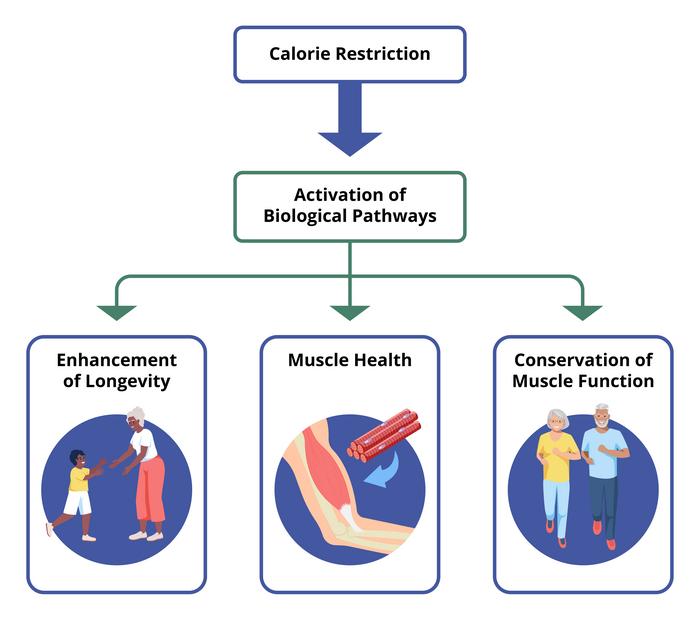FOR IMMEDIATE RELEASE: Friday, Oct. 13, 2023
CONTACT: [email protected], 301-496-1752

Credit: Illustration courtesy of NIA.
FOR IMMEDIATE RELEASE: Friday, Oct. 13, 2023
CONTACT: [email protected], 301-496-1752
Reducing overall calorie intake may rejuvenate your muscles and activate biological pathways important for good health, according to researchers at the National Institutes of Health and their colleagues. Decreasing calories without depriving the body of essential vitamins and minerals, known as calorie restriction, has long been known to delay the progression of age-related diseases in animal models. This new study, published in Aging Cell, suggests the same biological mechanisms may also apply to humans.
Researchers analyzed data from participants in the Comprehensive Assessment of Long-Term Effects of Reducing Intake of Energy (CALERIE), a study supported by the National Institute on Aging (NIA) that examined whether moderate calorie restriction conveys the same health benefits seen in animal studies. They found that during a two-year span, the goal for participants was to reduce their daily caloric intake by 25%, but the highest the group was able to reach was a 12% reduction. Even so, this slight reduction in calories was enough to activate most of the biological pathways that are important in healthy aging.
“A 12% reduction in calorie intake is very modest,” said corresponding author and NIA Scientific Director Luigi Ferrucci, M.D., Ph.D. “This kind of small reduction in calorie intake is doable and may make a big difference in your health.”
The research team next sought to understand the molecular underpinnings of the benefits seen in limited, previous research of calorie restriction in humans. One study showed that individuals on calorie restriction lost muscle mass and an average of 20 pounds of weight over the first year and maintained their weight for the second year. However, despite losing muscle mass, calorie restriction participants did not lose muscle strength, indicating calorie restriction improved the amount of force generated by each unit of muscle mass, called muscle specific force.
For the current study, scientists used thigh muscle biopsies from CALERIE participants that were collected when individuals joined the study and at one-year and two-year follow ups.
To figure out which human genes were impacted during calorie restriction, the scientists isolated messenger RNA (mRNA), a molecule that contains the code for proteins, from muscle samples. The team determined the protein sequence of each mRNA and used the information to identify which genes originated specific mRNAs. Further analysis helped the scientists establish which genes during calorie restriction were upregulated, meaning the cells made more mRNA; and which were downregulated, meaning the cells produced less mRNA. The researchers confirmed calorie restriction affected the same gene pathways in humans as in mice and non-human primates. For example, a lower caloric intake upregulated genes responsible for energy generation and metabolism, and downregulated inflammatory genes leading to lower inflammation.
“Since inflammation and aging are strongly coupled, calorie restriction represents a powerful approach to preventing the pro-inflammatory state that is developed by many older people,” said Ferrucci.
This research was supported by the NIA Intramural Research Program and the following NIH grants: R01AG061378, P30AG028716, R01AG054840, U01AG060906, R01AG071707, R33AG070455, U01AG020478, U01AG020480, U01AG020487, U01AG022132.
Reference: Das JK, et al. Calorie restriction modulates the transcription of genes related to stress response and longevity in human muscle: The CALERIE study. Aging Cell. 2023; Oct 12:e13963. doi: 10.1111/acel.13963.
About the National Institute on Aging (NIA): NIA leads the U.S. federal government effort to conduct and support research on aging and the health and well-being of older people. Learn more about age-related cognitive change and neurodegenerative diseases via NIA’s Alzheimer’s and related Dementias Education and Referral (ADEAR) Center website. Visit the main NIA website for information about a range of aging topics, in English and Spanish, and stay connected.
About the National Institutes of Health (NIH): NIH, the nation’s medical research agency, includes 27 Institutes and Centers and is a component of the U.S. Department of Health and Human Services. NIH is the primary federal agency conducting and supporting basic, clinical, and translational medical research, and is investigating the causes, treatments, and cures for both common and rare diseases. For more information about NIH and its programs, visit www.nih.gov.
NIH…Turning Discovery Into Health®
###
Journal
Aging Cell
DOI
10.1111/acel.13963
Method of Research
Experimental study
Subject of Research
Human tissue samples
Article Title
Calorie restriction modulates the transcription of genes related to stress response and longevity in human muscle: The CALERIE study
Article Publication Date
12-Oct-2023




